Overview
Data science is a rapidly developing field that involves computational principles, methods and systems for extracting and structuring knowledge from data. On a daily basis, large datasets (Big Data) are generated by activities in the sciences, society and commerce. Data scientists are constantly seeking patterns and predicting outcomes from these vast collections of data.
This enables them to extract insights from Big Data to facilitate business decision-making. The Bachelor of Science in Data Science is an interdisciplinary degree that is jointly offered by the Department of Mathematics and the Department of Computing and Informatics. In this four-year degree programme, mathematical content is combined with principles of statistics, computer science and software engineering to give a computer-aided approach to problem-solving in data analytics.
Graduates of this programme will have career opportunities as data science professionals in the public sector as well as in diverse industries where there is a growing need for extensive data collection, processing and analysis.
These include biomedical sciences, business intelligence, clean technology, consumer businesses, data science and analytics, e-commerce, finance, healthcare, info-communications, manufacturing, marketing, re/insurance, safety and security, technology, telecommunications, transportation etc.
Thus the programme is designed with sufficient technical depth to equip graduates with the ability to develop novel analytical tools for new scientific applications and industry problems that will emerge in future. By providing graduates with rich skillsets in data science the programme will contribute greatly to the achievement of both sustainable development goals and Kenya’s vision 2030 agenda through data-driven decision-making.
PHILOSOPHY OF THE PROGRAMME
Foster excellence in academic freedom, professionalism and integrity through quality scholarly teaching, training and research in Data Science.
RATIONALE OF THE PROGRAMME
Data science skills in its entirety qualifies one to work as a data scientist within a wide array of fields, from investigative journalism where the learner can analyse data to find stories, to financial modelling, financial fraud prediction, urban planning, forensics, agriculture, social media analysis, remote sensing, international development, and many others. The opportunities are endless for one to use your Data Science degree to improve our world. Some of the leading job titles for graduates include: data science career include: Data scientists, Machine Learning Engineers, Business Intelligence analyst, Data analyst and Digital Analyst among others. Modern organizations require professionals who can take the lead in selecting appropriate Data Science tools and models to apply to the specific situation of interest.
Needs assessment/market survey/situation analysis
The Bachelor of Science programme in Data Science is designed with a view of training high-quality graduates with requisite professional and technical skills to effectively handle problems of data science. The learners will be equipped with knowledge and skills in big data analytics, data mining, computing intelligence, Machine Learning, Statistical Learning, Algorithms at Scale and Large Scale database optimization. In addition, the learners will be equipped with data communication and research methodologies to enable them to develop strategies that will enhance the growth of the data science sub-sector.
Modes of Delivery:
-
Physical (face-to-face) : This will be offered through lectures, seminars, discussions, tutorials, guided practical experiments and demonstrations.
-
OPEN, DISTANCE LEARNING, AND E-LEARNING MODE: This will be offered off-campus using multi-media approach, including a variety of self-instructional print and electronic study materials.
-
Blended Learning: Blended learning (or hybrid learning) mode of delivery will combine face-to-face and online learning approaches by integrating technology and digital media with traditional instructor-led classroom activities.
Language(s) Used: The language used will be English
Intakes: The programme intake is in September of every year click the link below for more Information on the application procedure University of Nairobi online Application Click this link to apply
Contacts
The Chairman, Department of Mathematics.
P.O.Box 30197-00100
Telephone: 020 4914143 / 020 4914148
Email: maths@uonbi.ac.ke.
Structure
COURSE DURATION AND STRUCTURE
- The program shall be covered in a minimum of 8 semesters and a maximum of 16 semesters from the date of registration and each semester will be 15 weeks
- Each course unit shall have a minimum of 45 contact hours and shall be covered within a semester.
- The programme comprises 12 core units in year one, 12 core units in year two, 10 core units in year three and 10 core units in year four. This makes a total of 44-course units. Additional units shall be taken with the approval of the chairperson, department of mathematics.
- In year four, a student shall undertake a special project in data science which is equivalent to one unit.
Course Structure
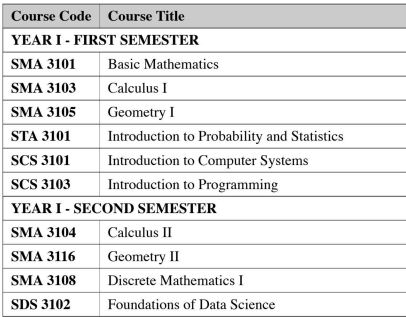
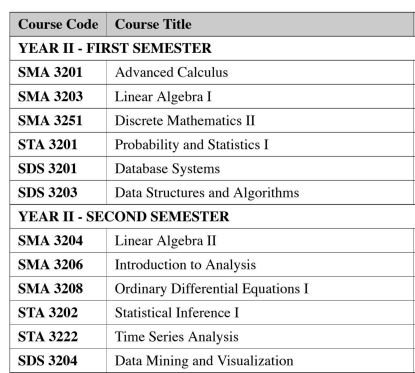
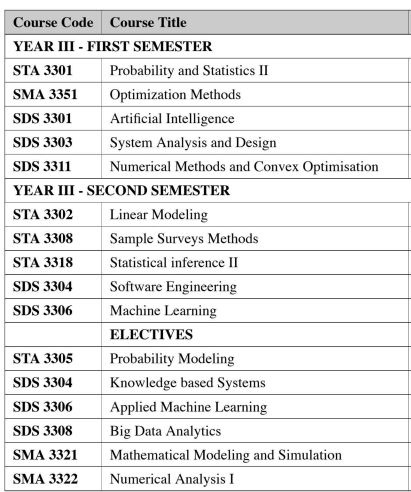
Admission Requirements
Schedule of Intakes:
The programme intake is in September of every year click the link below for more information on the application procedure University of Nairobi online Application Click this link to apply
Application Information
Before continuing please read the University of Nairobi admission requirements Please ensure that you meet the admission requirements before applying. Online Student Application Manual
MINIMUM ADMISSION REQUIREMENTS
Candidates must satisfy the University’s general admission criteria for undergraduate programmes.
In addition, the following shall be eligible for admission:
KCSE:
A holder of the Kenya Certificate of Secondary Education (KCSE) with a minimum aggregate performance of C+ (plus). In addition, candidates must have obtained a minimum of grade of B – (minus) in mathematics.
A-Level:
A holder of the Kenya Advanced Certificate of Education (KACE) with 2 principal passes in mathematics/physics, mathematics/chemistry, mathematics/geography, or Mathematics/Economics
Diploma in Computer Studies/Data Science/ Statistics/Education:
A holder of an ordinary diploma in computer studies, statistics, Data Management or education with mathematics as a major subject, with a minimum pass at credit level, from an institution recognized by the Senate.
A Bachelors Degree:
A holder of a Bachelor’s Degree from an institution recognized by the senate preferably with a good mathematics and computer science background.
REGULATIONS FOR CREDIT TRANSFER AND EXEMPTIONS
Credit Transfer
- The programme shall allow a maximum of one-third ( 1/3 ) of credit transfer in accordance with the University regulations
- A candidate who has been admitted to this programme and has taken and passes a course unit offered within another degree programme, may apply for transfer of the credit earned within the previous programme to this programme
- Credit transfers will only be approved from institutions and degree programs recognized by then University senate
- Where a candidate wishes to transfer credit from a degree programme of another institution to this programme, the candidate shall send an application to the academic registrar justifying the request and provide evidence of the credentials which support such a request.
- Credits may not be transferred in the third year and fourth year of study.
- Application for credit transfer shall be considered only after the applicant has paid the exemption fees.
exemptions
- Where a candidate wishes to be exempted from any course unit(s), the candidate shall send an application to the academic registrar justifying the request and provide evidence of credentials which support such a request. Such a candidate may be required to sit and pass an ordinary university exam in that unit.
- Regulation 1. above notwithstanding, all course units which contribute towards the final award of the degree will be examined.
- The examination undertaken under regulation 2. shall be graded out of 100% and the pass mark shall be 40%.
- Application for exemption shall be considered only after the applicant has paid an exemption fee.
Careers
Attachment opportunities
Students can be attached but not limited to the following
- Non-governmental organizations
- Government parastatals and institutions
- Research institutions
- International organizations
- Financial and non-financial institutions
Career prospects/opportunities
- Data scientist
- Data analyst
- Machine Learning
- Business Analyst
- Data architect
- Research analyst
- Quantitative analyst
- Process analyst
Fees and Funding
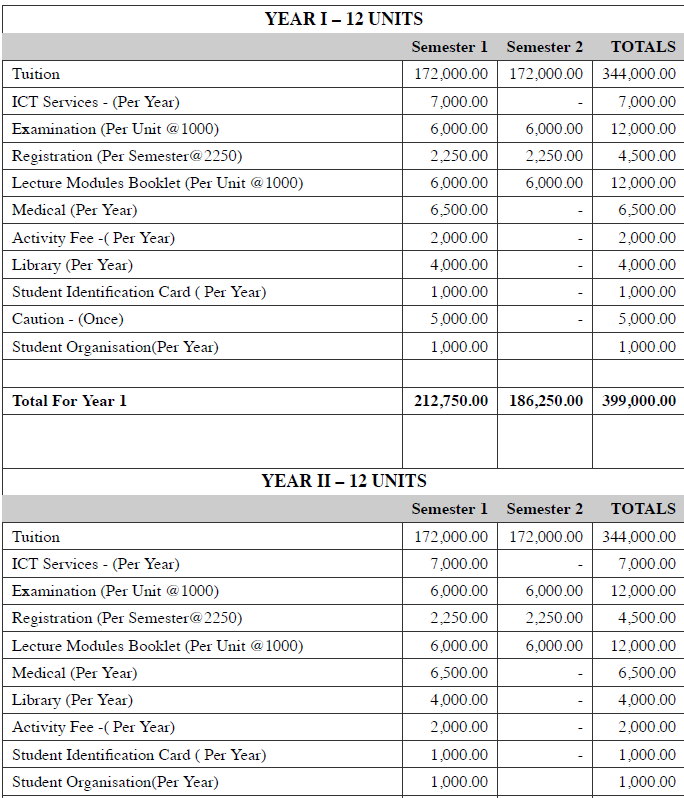
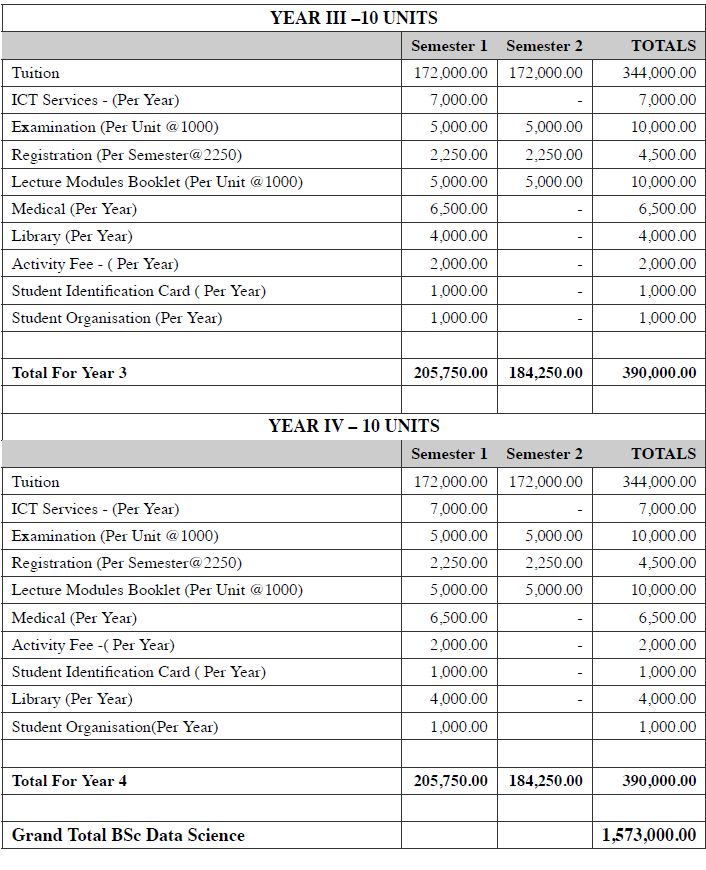
Exam Regulations
COURSEWORK EXAMINATIONS
Common University regulations for examinations shall apply
All course units taken in a given semester shall be examined at the end of that semester.
A candidate for the degree shall satisfactorily complete such coursework and assignments as may be required for the scheme of study. Satisfactory completion of any such requirements shall be a condition for admission to the examination at the end of that semester of study
A written examination for a course unit shall have a minimum duration of two hours.
The complete assessment of a taught course unit shall consist of a continuous assessment test, practical assignment and a written examination. The contribution towards the unit aggregate score shall be 30% for continuous assessment and 70% for the final written examination.
Each course unit or its equivalent shall be graded independently out of a maximum of 100 marks and shall be according to the following grading system
The Committee of Examiners with the approval of the Senate shall give the following recommendations for each candidate:
- Proceed to the subsequent year of study after passing at least 10 units in the 1st or 2nd year of study and at least 8 units in the 3rd year of study.
- Qualify for supplementary examinations after passing 7 to 9 units in the 1st or 2nd year of study, and 6 or 7 units in the 3rd or 4th year of study.
- Repeat the year of study after failing 6 to 8 units in the 1st or 2nd year of study, and failing 5 or 6 units in the 3rd or 4th year of study.
- Discontinued in any year of study after failing in at least 8 units in the 1st or 2nd year of study, and failing at least 6 units in the 3rd or 4th year of study.
- Eligible to graduate in the final year of study after passing at least 8 units in the 4th year of study.
A candidate who fails to take any prescribed examination with good cause may, on the recommendation of the Faculty Committee of Examiners and approval by the Senate, be allowed to take a special examination for the unit before the start of the following academic year
A pass obtained in any supplementary Examination shall be recorded as 40% in the candidate’s academic record.
In the event that this syllabus is revised, a candidate who is required to take any examination shall be required to take the examination in the equivalent course unit(s) in the revised syllabus.
The final award of the degree shall be based on the average mark scored in the third and fourth years of study.
GRADING SYSTEM
Range of Marks (%) Grade
70% to 100% A
60% to < 70% B
50% to < 60% C
40% to < 50% D
Below 40% (Fail) E
CLASSIFICATION OF THE DEGREE
The degree is classified as follows:
Division Average (%)
FIRST CLASS HONOURS 70% and above
UPPER SECOND CLASS HONOURS 60% to < 70%
LOWER SECOND CLASS HONOURS 50% to < 60%
PASS 40% to < 50%
